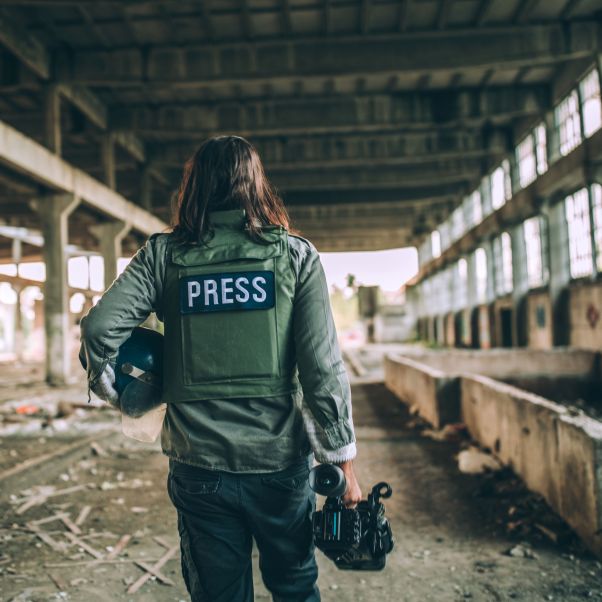With growing solidarity and support from the Council of Europe, journalists, lawyers, and activists in Bosnia and Herzegovina are stepping up efforts to counter Strategic Lawsuits Against Public Participation (SLAPPs), lawsuits aimed at silencing critical voices and discouraging public interest reporting.
Faced with lawsuits intended to intimidate and financially drain them, journalists, lawyers, and activists in Bosnia and Herzegovina are taking action to protect free speech and the right to report on matters of public interest. With the Council of Europe providing targeted training and support, key stakeholders are now more equipped to recognise and combat SLAPPs, Council of Europe writes.
Renata Radić Dragić, a journalist from the Center for Investigative Journalism (CIN) in Sarajevo, has seen firsthand the impact of SLAPPs. “I’m part of a team that works on stories under the supervision of editors and fact-checkers, following strict internal rules to ensure no information is published without proof. Despite this, we have still faced lawsuits,” she said. Three of the stories she worked on led to defamation lawsuits. While CIN takes responsibility for defending its journalists, Renata highlighted the personal toll of these lawsuits. “They consume time for preparing the defense and testifying,” she added.
For some activists, the effects of SLAPPs are deeply personal. Sunčica Kovačević, activist and member of the Coalition for the Protection of Rivers of BiH and the ACT Foundation, described the process as “a disorienting experience where you never know which rules apply or when a lawsuit might be filed against you.” She revealed that her experience with SLAPPs began three years ago when a Belgian company filed a lawsuit against her for defamation. “These lawsuits have a dual purpose: to punish me for speaking out and to stop me from continuing my work,” she said. The financial burden of legal fees and expert reports requested by the plaintiffs only adds to the pressure. “At first, I feared the domino effect these lawsuits could have on others who work on public interest issues. But over time, I realised that solidarity and collective action are our best chance of minimising their negative effects,” she concluded.
Legal challenges also exist for lawyers attempting to integrate anti-SLAPP protections into Bosnia and Herzegovina’s legal system. Dario Sandić, a lawyer, emphasised the importance of recognising anti-SLAPP directives as a human rights protection tool. “It took years for judges, prosecutors, and lawmakers to understand the importance of the European Convention on Human Rights and Freedoms, and the judgments of the Court in Strasbourg as a “new” source of law in the legal system of BiH, all with the aim of protecting the rights and freedoms of citizens,” Dario noted adding that the same challenge lies ahead for anti-SLAPP directives. According to Sandić, without formal recognition of SLAPP protections in the country’s legal framework, it will be difficult for the judiciary to apply them in practice. He also stressed the need for greater awareness among journalists, lawyers, and citizens about the harmful effects of SLAPP lawsuits. “The public doesn’t fully understand the importance of free speech and the role of journalism,” he noted.
The Council of Europe’s training sessions, organised under the action “Protecting freedom of expression and of the media in Bosnia and Herzegovina (PROFREX)”, implemented by the Division for Co-operation on Freedom of Expression of the Council of Europe and is part of the joint European Union and the Council of Europe programme “Horizontal Facility for the Western Balkans and Türkiye”, have played a pivotal role in building resilience against SLAPPs.
Renata Radić Dragić noted that the training helped her better understand the distinction between SLAPPs and ordinary defamation lawsuits, which is key to mounting an effective defence. For Dario Sandić, the training sessions are crucial for introducing the anti-SLAPP concept into the legal framework of Bosnia and Herzegovina. “These sessions are currently the only form of awareness-raising on SLAPPs in the country. They help inform legal professionals and the wider public about European efforts to protect freedom of speech,” he said. Sunčica Kovačević echoed this sentiment, highlighting the value of bringing together journalists, lawyers, and civil society actors in one space to exchange knowledge and experiences.
While the path to adopting anti-SLAPP laws in Bosnia and Herzegovina remains uncertain, the message from journalists, lawyers, and activists is clear: collaboration and solidarity are essential. Through joint efforts and targeted training, they are better equipped to defend themselves and protect the public’s right to know.
Source link : http://www.bing.com/news/apiclick.aspx?ref=FexRss&aid=&tid=67892e73b23d41bf9c7a180ca08fa33c&url=https%3A%2F%2Fsarajevotimes.com%2Fjournalists-lawyers-and-activists-join-forces-to-fight-slapp-in-bih%2F&c=1325344034293570600&mkt=de-de
Author :
Publish date : 2025-01-15 23:11:00
Copyright for syndicated content belongs to the linked Source.
